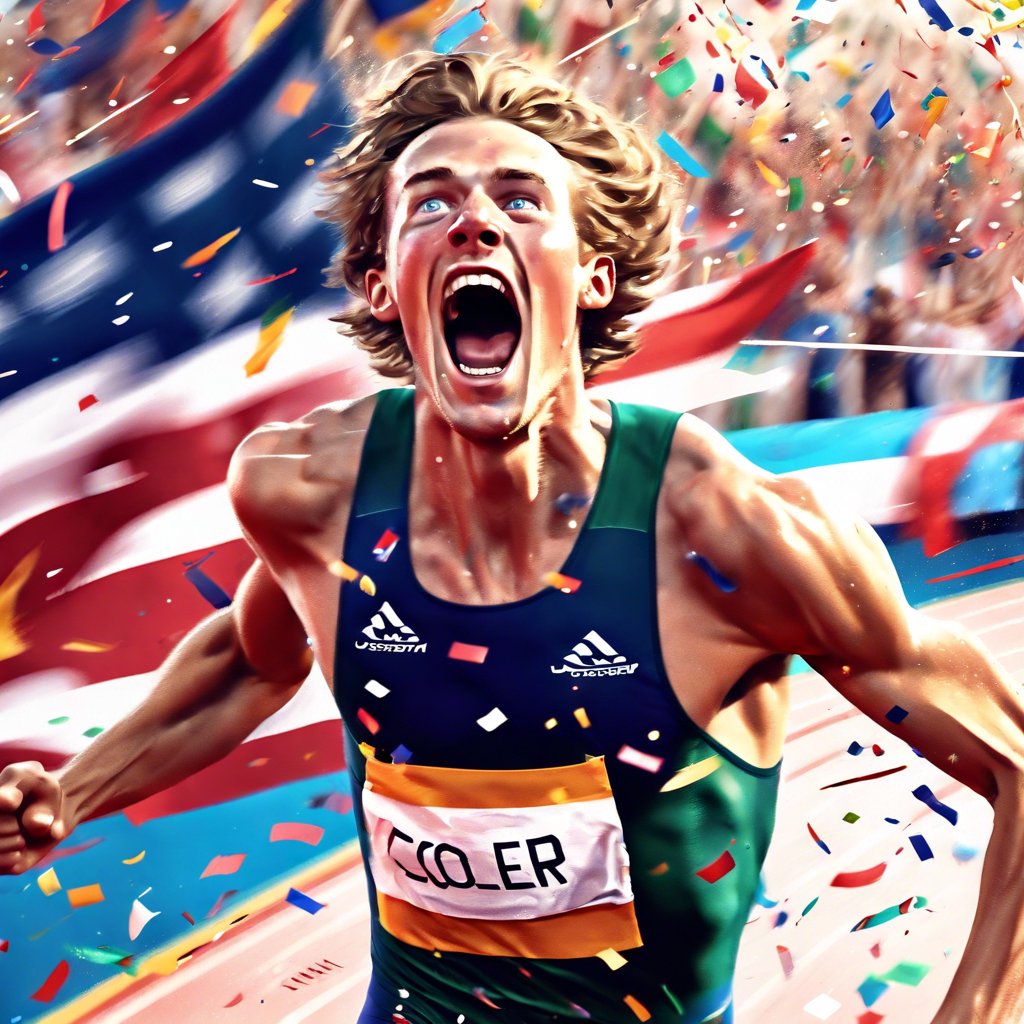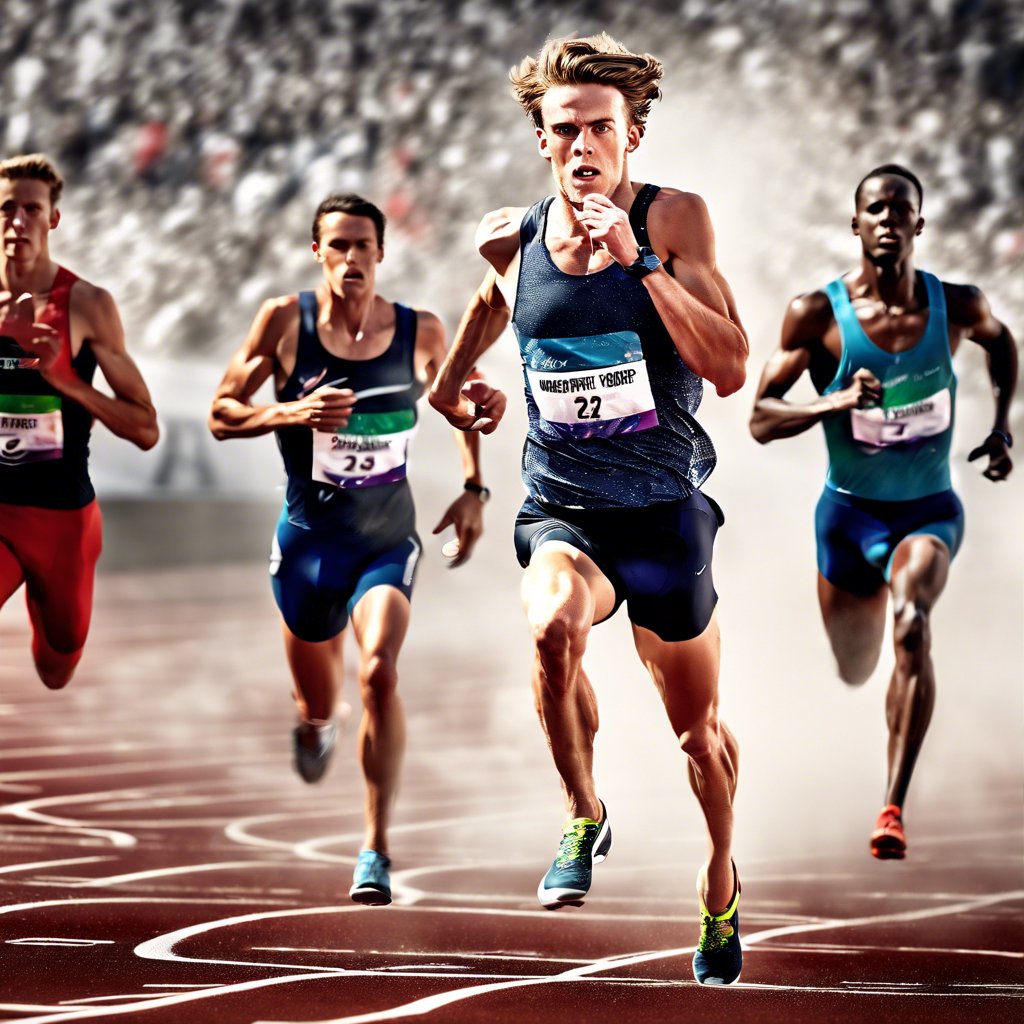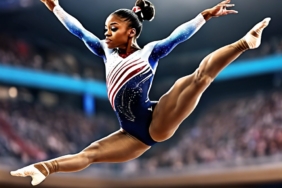Cole Hocker Stuns the World in Olympic 1500-Meter Final
In a breathtaking display of speed and determination, Cole Hocker of the United States pulled off one of the most significant upsets in Olympic running history on Tuesday night. He surged past the highly favored Jakob Ingebrigtsen and outkicked reigning world champion Josh Kerr, turning what was anticipated to be a two-man showdown into a thrilling surprise victory. With a phenomenal burst of energy in the final 30 meters, Hocker, originally from Indianapolis and molded at the University of Oregon—the epicenter of American distance running since the days of the legendary Steve Prefontaine—finished with an Olympic record time of 3:27.65. He crossed the finish line just a fraction of a second ahead of Kerr, who had expected to dominate the race.
Yared Nuguse, Hocker’s American teammate, displayed incredible prowess as well, outpacing Ingebrigtsen to claim the bronze medal. The defending Olympic champion, Ingebrigtsen, who had set a blistering pace for the first 1300 meters, ultimately faded to fourth place, marking yet another significant disappointment in his career.
For Ingebrigtsen, this loss was particularly tough to digest, especially given his fierce confidence and star power. As the last runner introduced for the race, he held up a single index finger, symbolizing his aspirations to the 80,000 fans in attendance, who watched eagerly on the giant video screens. However, he should have raised four fingers on a night that culminated in his third consecutive defeat in championship 1500-meter races, including the 2022 and 2023 World Athletics Championships.
The evening was perfect for racing—clear skies, still air, and a pleasantly cool temperature. Fans anticipated an epic battle between the dominant Ingebrigtsen and the audacious Kerr, who had been a thorn in Ingebrigtsen’s side for years. The race unfolded according to expectations until the final turn. Ingebrigtsen, the fastest in the field, immediately took the lead and pushed a blistering pace, clocking in at 1:51.3 for the first 800 meters. His strategy was both bold and risky, as he aimed to win wire-to-wire, driven by the fear that others could finish faster than him. He hoped to create a gap that would keep his competitors from catching up.
As the race neared its climax, Ingebrigtsen felt the crowd’s roar intensify to deafening levels. A glance to his right revealed Kerr closing in fast. By the time they reached the final stretch, Kerr was poised to overtake him. But Hocker, who had kept himself nestled in the middle of the pack until the opportune moment, unleashed a remarkable burst of speed. He had been strategically waiting for his moment and, when it arrived, he propelled himself forward, setting an Olympic and American record in one of the event’s most iconic races.
“I kind of told myself that I’m in this race too,” Hocker reflected after the race. “If they let me fly under the radar, then so be it. I think that might’ve just been the best.”
Kerr, who had a front-row seat to Hocker’s stunning victory, also delivered an impressive performance, achieving a personal best and setting a national record. Yet, he was blissfully unaware of the turmoil unfolding behind him. Upon seeing the scoreboard and realizing Ingebrigtsen had slipped to fourth place, a huge grin spread across his face. He turned to Hocker and Nuguse, applauding them as if they were old friends celebrating a monumental achievement.
Neil Gourley, Kerr’s teammate from Great Britain, noted that he was not surprised by Hocker’s triumph. “If Cole is there and he has anything left in the last 150 meters, he’s dangerous,” he stated. “Anyone who saw what he did at the U.S. Nationals wouldn’t be shocked.”
Yet, how could one not be amazed? This race was circled on the Olympic calendar by running enthusiasts, but not primarily because of Hocker. In a sport often characterized by respect and sportsmanship, Ingebrigtsen and Kerr had engaged in a bit of friendly banter leading up to the event.
Ingebrigtsen, who burst onto the scene five years ago as a middle-distance champion from Norway—a country more renowned for its skiing medals than its track achievements—enjoyed a certain charm. He was the youngest of three running brothers, with the oldest, Henrik, finishing fifth in the 1500 meters at the 2012 Olympics, and the middle brother, Filip, winning bronze in the same event at the 2017 World Championships. Their father, Gjert, trained them rigorously while managing their personal lives.
The Ingebrigtsen family allowed cameras to document their journey, resulting in a popular documentary called “Team Ingebrigtsen,” which significantly raised Jakob’s profile, especially after he won gold in the 1500 meters at the Tokyo Olympics in 2021. He further solidified his dominance with gold medals in the 5,000 at the World Championships in 2022 and 2023. However, along the way, his charm seemed to diminish, particularly in Scotland, where Kerr and other athletes began to challenge his supremacy.
Ingebrigtsen’s confidence occasionally bordered on arrogance, especially when he began losing races to competitors like Kerr. Despite his talent, he struggled with graciousness in both victory and defeat. He once remarked, “You can’t be disappointed with people not being better,” a statement that did not sit well with many, especially following his defeat to Jake Wightman at the 2022 World Championships.
On Tuesday night, when asked if he regretted his decision to lead the race so aggressively, Ingebrigtsen had mixed feelings. “Of course, it’s a tactical error that I am not able to reduce my pace the first 800,” he admitted. “Just a little too hard.” He acknowledged that with 650 meters remaining, he sensed the others were gaining on him and, despite his efforts to respond, he ultimately ran out of gas, admitting that the 1500 meters had proven “just 100 meters too much.”
In contrast, Hocker, only 23 years old, is part of an exciting new wave of American middle-distance runners who delivered one of the country’s best performances in Olympic history. With Nuguse, the 25-year-old son of Ethiopian immigrants who was born in Kentucky and attended Notre Dame, finishing third, and Hobbs Kessler, a 21-year-old from Ann Arbor, coming in fifth, American middle-distance running appears to be in good hands.
Kessler remarked on the challenge of leading the race, noting, “It just shows how hard it is to run from the front.” And indeed, that reality was evident on Tuesday night, particularly with an energized Scot and two determined Americans hot on his heels.
“Both me and Cole knew coming in we could win on the right day,” Nuguse said, reflecting on their shared moment of triumph. “A really cool moment.” For Hocker, the victory was exhilarating. “That’s an unbelievable feeling,” he expressed, recalling how he felt propelled by the energy of the stadium and a sense of divine guidance. “My body just kind of did it for me. My mind was all there, and I saw that finish line.”
Required Reading
- In the ‘Mile of the Century,’ Josh Kerr adds fuel to the Olympics’ hottest rivalry
- Jake Wightman interview: ‘Britain is the best middle-distance nation in the world’
(Photo: Michael Steele / Getty Images)















